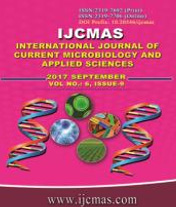


 National Academy of Agricultural Sciences (NAAS)
National Academy of Agricultural Sciences (NAAS)

|
PRINT ISSN : 2319-7692
Online ISSN : 2319-7706 Issues : 12 per year Publisher : Excellent Publishers Email : editorijcmas@gmail.com / submit@ijcmas.com Editor-in-chief: Dr.M.Prakash Index Copernicus ICV 2018: 95.39 NAAS RATING 2020: 5.38 |
Dengue viral infection is now recognized as one of the most important mosquito borne human infections of 21st century. About 40% of the world population has been living in areas where there is a risk of Dengue transmission. The epidemics in endemic countries are occurring more frequently with increasing magnitude. Dengue infection is a systemic and dynamic disease. Timely and correct diagnosis is very critical for patient management. This study was conducted among the PUO cases admitted in the Medical and Paediatric Medicine wards at Govt. Thiruvannamalai Medical College. Aim of this work is to study the Seroprevalance of Dengue infection in these cases by subjecting the serum samples with IgM capture ELISA technique, to categorize the Dengue cases as Dengue Fever, Dengue Haemorrhagic Fever and Dengue Shock Syndrome (according to WHO guidelines) and compare between 2 consecutive years. 1176 Adults were tested during 2015 and positives were 184 cases, giving a positivity rate of 15%. 112 children were tested of which 16 were positive, giving a positivity rate of 14% 900 Adults were tested during 2016 and positives were 22 cases, giving a positivity rate of 2.5%. 175 children were tested of which 2 were positive, giving a positivity rate of 1.1%. It was found that more number of cases was noticed from November to February than that of other months. Increased incidence of Dengue was found during monsoon and post monsoon period it was found that among the Dengue positive cases 164 cases (73%) were Dengue fever, 60 cases (27) were Dengue haemorrhagic fever and there was no case with Dengue shock syndrome. As per the present study Dengue cases were more during the month of November to February in the post monsoon season which can be useful to public health authorities to plan special preventive strategies. Dengue fever (72.5%) and Dengue haemorrhagic fever (27.5%) were present and there was no case with Dengue shock syndrome, as per WHO guidelines. Classification helps in knowing the type of infection prevalent in Thiruvannamalai. The Dengue IgM seropositivity among the suspected cases indicates active Dengue virus activity. Increase in the probable secondary infection especially in a country like ours where multiple serotypes are prevalent raises concern over probable increase in the incidence of the more serious DHF/DSS.
 |
 |
 |
 |
 |